Psychology of Everyday Life: Detailed Analysis Report
VerifiedAdded on 2022/11/25
|12
|4200
|496
Report
AI Summary
This report delves into the psychology of everyday life, starting with an analysis of an experiment by Dr. Jones examining the effects of soda consumption on driving performance. It identifies dependent, independent, and extraneous variables, while also exploring potential research questions and the merits and demerits of qualitative research methods. The report then examines the role of men and women through an evolutionary lens, discussing behavioral approaches like Pavlov's classical conditioning and Skinner's operant conditioning. Finally, it considers prescriptive individual and group orientations from social psychology, and explores a psychological approach to leadership emphasizing social distancing for protecting the vulnerable. The report provides a comprehensive overview of the subject matter, drawing connections between various psychological theories and their real-world applications.

Psychology of everyday life
Paraphrase This Document
Need a fresh take? Get an instant paraphrase of this document with our AI Paraphraser
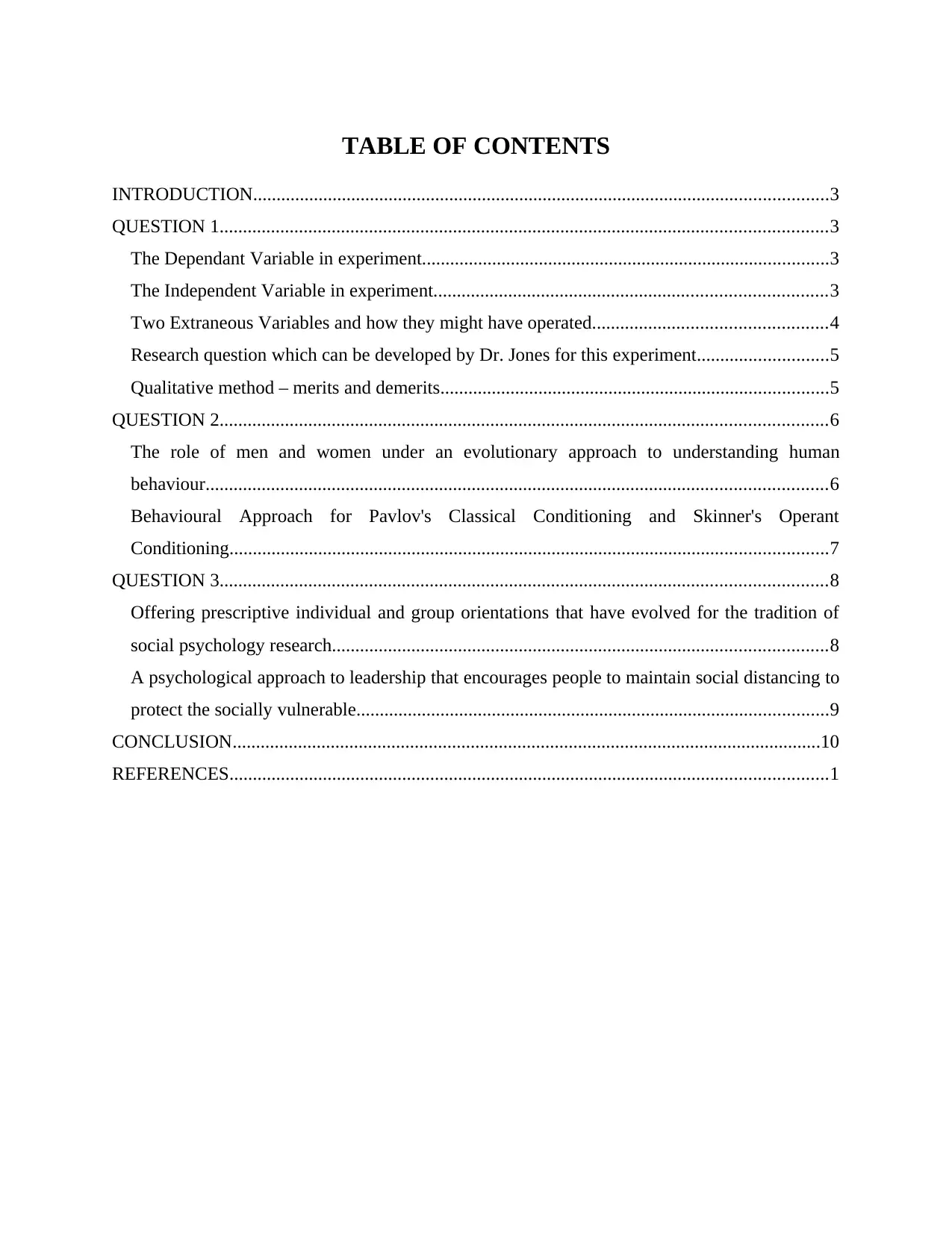
TABLE OF CONTENTS
INTRODUCTION...........................................................................................................................3
QUESTION 1..................................................................................................................................3
The Dependant Variable in experiment.......................................................................................3
The Independent Variable in experiment....................................................................................3
Two Extraneous Variables and how they might have operated..................................................4
Research question which can be developed by Dr. Jones for this experiment............................5
Qualitative method – merits and demerits...................................................................................5
QUESTION 2..................................................................................................................................6
The role of men and women under an evolutionary approach to understanding human
behaviour.....................................................................................................................................6
Behavioural Approach for Pavlov's Classical Conditioning and Skinner's Operant
Conditioning................................................................................................................................7
QUESTION 3..................................................................................................................................8
Offering prescriptive individual and group orientations that have evolved for the tradition of
social psychology research..........................................................................................................8
A psychological approach to leadership that encourages people to maintain social distancing to
protect the socially vulnerable.....................................................................................................9
CONCLUSION..............................................................................................................................10
REFERENCES................................................................................................................................1
INTRODUCTION...........................................................................................................................3
QUESTION 1..................................................................................................................................3
The Dependant Variable in experiment.......................................................................................3
The Independent Variable in experiment....................................................................................3
Two Extraneous Variables and how they might have operated..................................................4
Research question which can be developed by Dr. Jones for this experiment............................5
Qualitative method – merits and demerits...................................................................................5
QUESTION 2..................................................................................................................................6
The role of men and women under an evolutionary approach to understanding human
behaviour.....................................................................................................................................6
Behavioural Approach for Pavlov's Classical Conditioning and Skinner's Operant
Conditioning................................................................................................................................7
QUESTION 3..................................................................................................................................8
Offering prescriptive individual and group orientations that have evolved for the tradition of
social psychology research..........................................................................................................8
A psychological approach to leadership that encourages people to maintain social distancing to
protect the socially vulnerable.....................................................................................................9
CONCLUSION..............................................................................................................................10
REFERENCES................................................................................................................................1
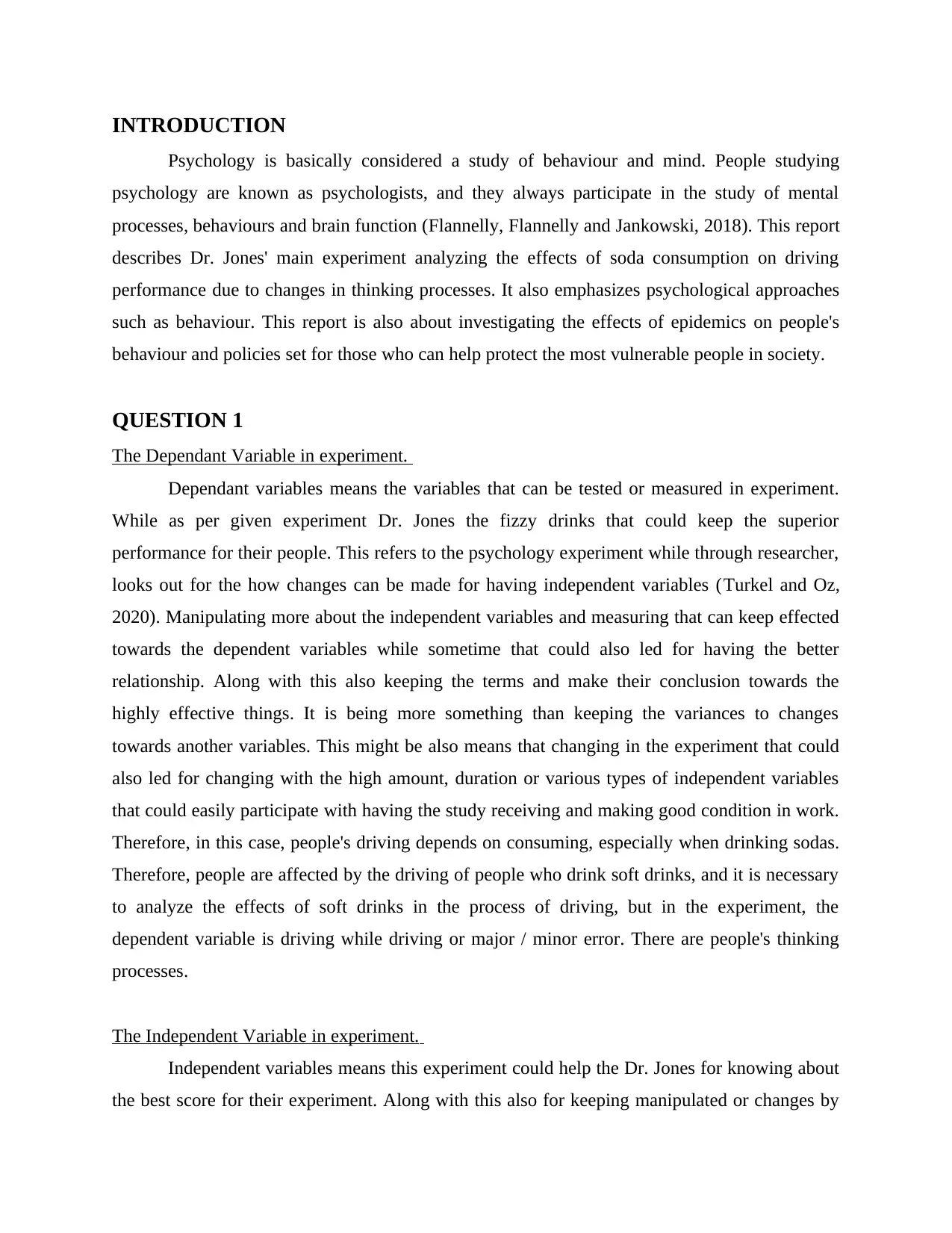
INTRODUCTION
Psychology is basically considered a study of behaviour and mind. People studying
psychology are known as psychologists, and they always participate in the study of mental
processes, behaviours and brain function (Flannelly, Flannelly and Jankowski, 2018). This report
describes Dr. Jones' main experiment analyzing the effects of soda consumption on driving
performance due to changes in thinking processes. It also emphasizes psychological approaches
such as behaviour. This report is also about investigating the effects of epidemics on people's
behaviour and policies set for those who can help protect the most vulnerable people in society.
QUESTION 1
The Dependant Variable in experiment.
Dependant variables means the variables that can be tested or measured in experiment.
While as per given experiment Dr. Jones the fizzy drinks that could keep the superior
performance for their people. This refers to the psychology experiment while through researcher,
looks out for the how changes can be made for having independent variables (Turkel and Oz,
2020). Manipulating more about the independent variables and measuring that can keep effected
towards the dependent variables while sometime that could also led for having the better
relationship. Along with this also keeping the terms and make their conclusion towards the
highly effective things. It is being more something than keeping the variances to changes
towards another variables. This might be also means that changing in the experiment that could
also led for changing with the high amount, duration or various types of independent variables
that could easily participate with having the study receiving and making good condition in work.
Therefore, in this case, people's driving depends on consuming, especially when drinking sodas.
Therefore, people are affected by the driving of people who drink soft drinks, and it is necessary
to analyze the effects of soft drinks in the process of driving, but in the experiment, the
dependent variable is driving while driving or major / minor error. There are people's thinking
processes.
The Independent Variable in experiment.
Independent variables means this experiment could help the Dr. Jones for knowing about
the best score for their experiment. Along with this also for keeping manipulated or changes by
Psychology is basically considered a study of behaviour and mind. People studying
psychology are known as psychologists, and they always participate in the study of mental
processes, behaviours and brain function (Flannelly, Flannelly and Jankowski, 2018). This report
describes Dr. Jones' main experiment analyzing the effects of soda consumption on driving
performance due to changes in thinking processes. It also emphasizes psychological approaches
such as behaviour. This report is also about investigating the effects of epidemics on people's
behaviour and policies set for those who can help protect the most vulnerable people in society.
QUESTION 1
The Dependant Variable in experiment.
Dependant variables means the variables that can be tested or measured in experiment.
While as per given experiment Dr. Jones the fizzy drinks that could keep the superior
performance for their people. This refers to the psychology experiment while through researcher,
looks out for the how changes can be made for having independent variables (Turkel and Oz,
2020). Manipulating more about the independent variables and measuring that can keep effected
towards the dependent variables while sometime that could also led for having the better
relationship. Along with this also keeping the terms and make their conclusion towards the
highly effective things. It is being more something than keeping the variances to changes
towards another variables. This might be also means that changing in the experiment that could
also led for changing with the high amount, duration or various types of independent variables
that could easily participate with having the study receiving and making good condition in work.
Therefore, in this case, people's driving depends on consuming, especially when drinking sodas.
Therefore, people are affected by the driving of people who drink soft drinks, and it is necessary
to analyze the effects of soft drinks in the process of driving, but in the experiment, the
dependent variable is driving while driving or major / minor error. There are people's thinking
processes.
The Independent Variable in experiment.
Independent variables means this experiment could help the Dr. Jones for knowing about
the best score for their experiment. Along with this also for keeping manipulated or changes by
⊘ This is a preview!⊘
Do you want full access?
Subscribe today to unlock all pages.

Trusted by 1+ million students worldwide
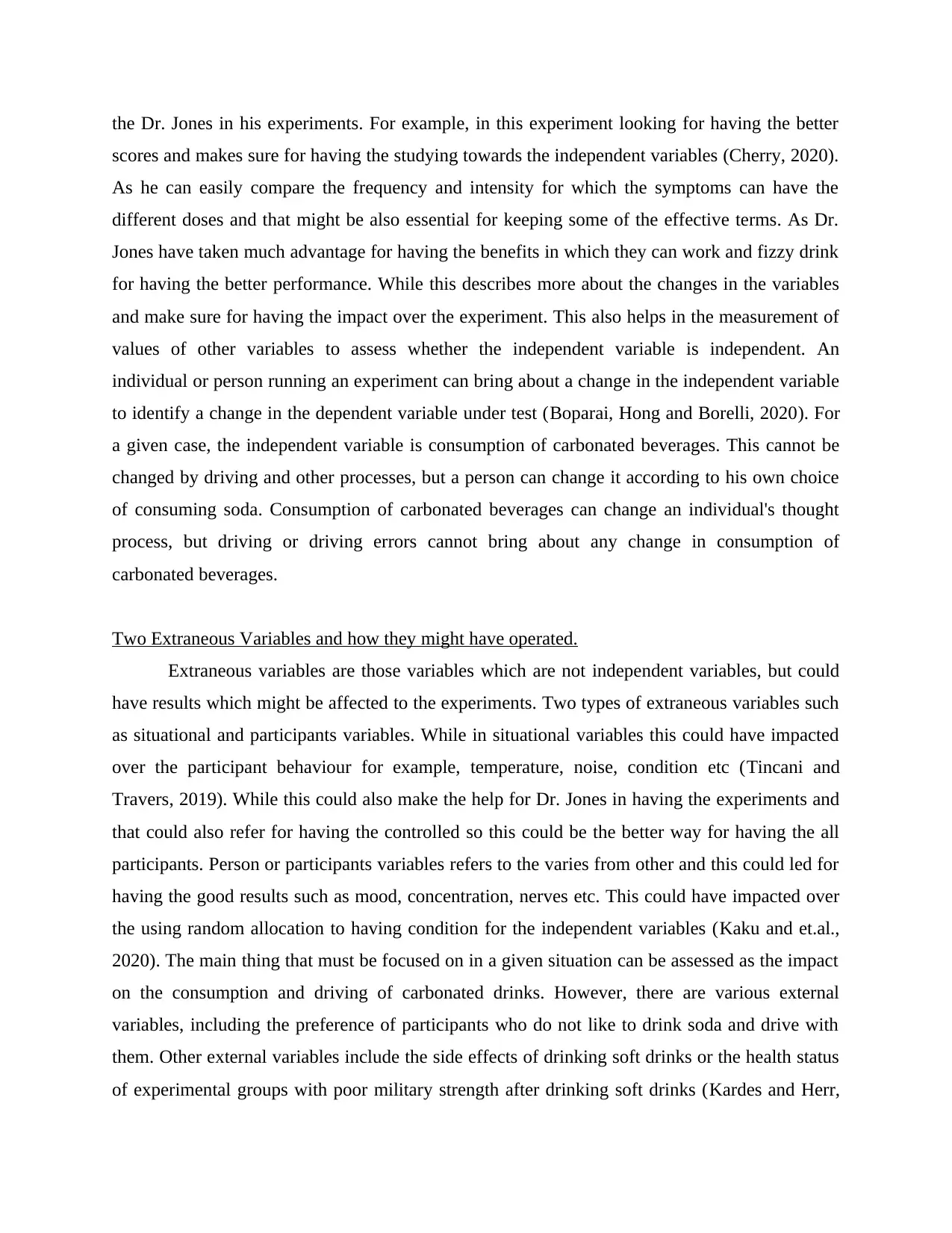
the Dr. Jones in his experiments. For example, in this experiment looking for having the better
scores and makes sure for having the studying towards the independent variables (Cherry, 2020).
As he can easily compare the frequency and intensity for which the symptoms can have the
different doses and that might be also essential for keeping some of the effective terms. As Dr.
Jones have taken much advantage for having the benefits in which they can work and fizzy drink
for having the better performance. While this describes more about the changes in the variables
and make sure for having the impact over the experiment. This also helps in the measurement of
values of other variables to assess whether the independent variable is independent. An
individual or person running an experiment can bring about a change in the independent variable
to identify a change in the dependent variable under test (Boparai, Hong and Borelli, 2020). For
a given case, the independent variable is consumption of carbonated beverages. This cannot be
changed by driving and other processes, but a person can change it according to his own choice
of consuming soda. Consumption of carbonated beverages can change an individual's thought
process, but driving or driving errors cannot bring about any change in consumption of
carbonated beverages.
Two Extraneous Variables and how they might have operated.
Extraneous variables are those variables which are not independent variables, but could
have results which might be affected to the experiments. Two types of extraneous variables such
as situational and participants variables. While in situational variables this could have impacted
over the participant behaviour for example, temperature, noise, condition etc (Tincani and
Travers, 2019). While this could also make the help for Dr. Jones in having the experiments and
that could also refer for having the controlled so this could be the better way for having the all
participants. Person or participants variables refers to the varies from other and this could led for
having the good results such as mood, concentration, nerves etc. This could have impacted over
the using random allocation to having condition for the independent variables (Kaku and et.al.,
2020). The main thing that must be focused on in a given situation can be assessed as the impact
on the consumption and driving of carbonated drinks. However, there are various external
variables, including the preference of participants who do not like to drink soda and drive with
them. Other external variables include the side effects of drinking soft drinks or the health status
of experimental groups with poor military strength after drinking soft drinks (Kardes and Herr,
scores and makes sure for having the studying towards the independent variables (Cherry, 2020).
As he can easily compare the frequency and intensity for which the symptoms can have the
different doses and that might be also essential for keeping some of the effective terms. As Dr.
Jones have taken much advantage for having the benefits in which they can work and fizzy drink
for having the better performance. While this describes more about the changes in the variables
and make sure for having the impact over the experiment. This also helps in the measurement of
values of other variables to assess whether the independent variable is independent. An
individual or person running an experiment can bring about a change in the independent variable
to identify a change in the dependent variable under test (Boparai, Hong and Borelli, 2020). For
a given case, the independent variable is consumption of carbonated beverages. This cannot be
changed by driving and other processes, but a person can change it according to his own choice
of consuming soda. Consumption of carbonated beverages can change an individual's thought
process, but driving or driving errors cannot bring about any change in consumption of
carbonated beverages.
Two Extraneous Variables and how they might have operated.
Extraneous variables are those variables which are not independent variables, but could
have results which might be affected to the experiments. Two types of extraneous variables such
as situational and participants variables. While in situational variables this could have impacted
over the participant behaviour for example, temperature, noise, condition etc (Tincani and
Travers, 2019). While this could also make the help for Dr. Jones in having the experiments and
that could also refer for having the controlled so this could be the better way for having the all
participants. Person or participants variables refers to the varies from other and this could led for
having the good results such as mood, concentration, nerves etc. This could have impacted over
the using random allocation to having condition for the independent variables (Kaku and et.al.,
2020). The main thing that must be focused on in a given situation can be assessed as the impact
on the consumption and driving of carbonated drinks. However, there are various external
variables, including the preference of participants who do not like to drink soda and drive with
them. Other external variables include the side effects of drinking soft drinks or the health status
of experimental groups with poor military strength after drinking soft drinks (Kardes and Herr,
Paraphrase This Document
Need a fresh take? Get an instant paraphrase of this document with our AI Paraphraser
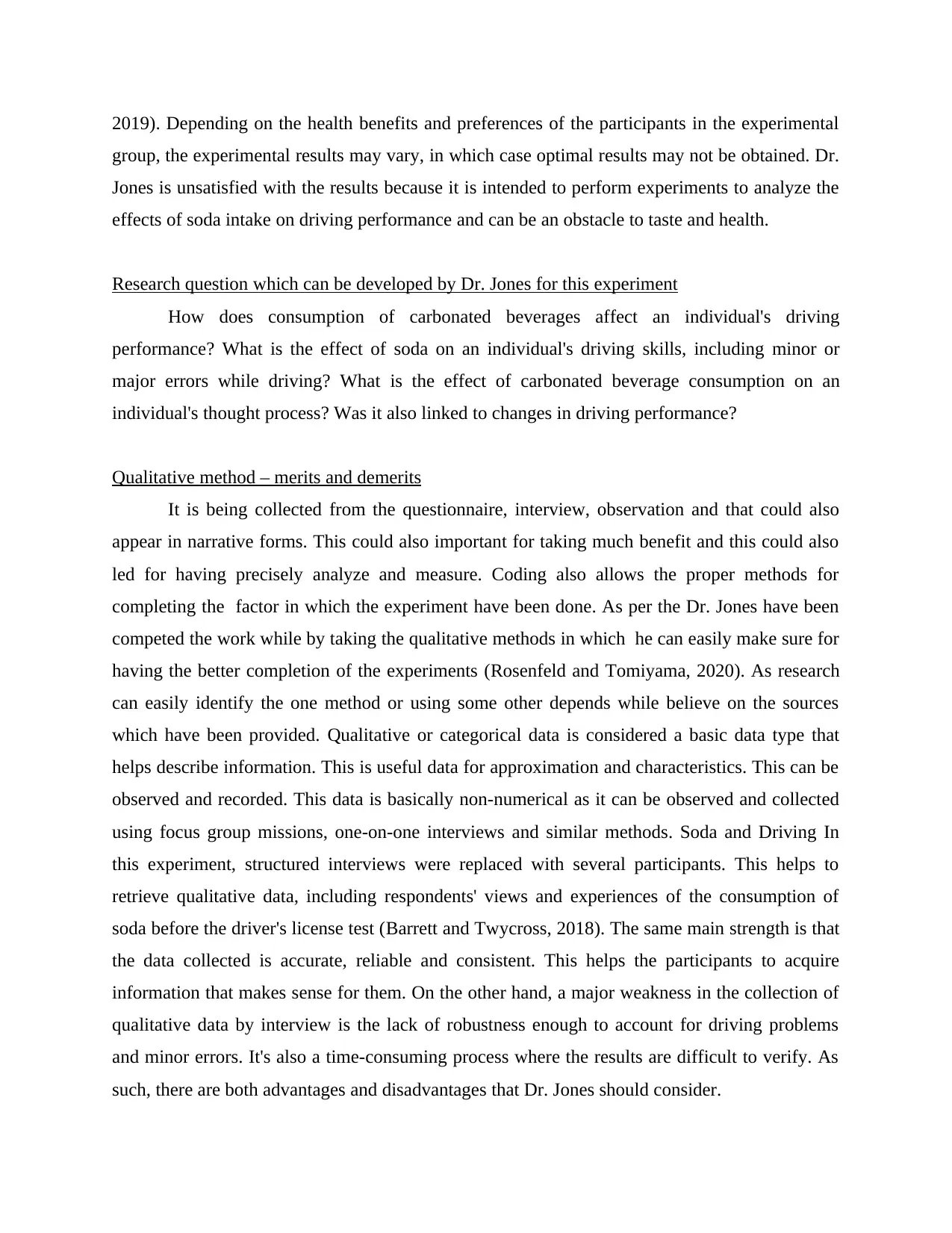
2019). Depending on the health benefits and preferences of the participants in the experimental
group, the experimental results may vary, in which case optimal results may not be obtained. Dr.
Jones is unsatisfied with the results because it is intended to perform experiments to analyze the
effects of soda intake on driving performance and can be an obstacle to taste and health.
Research question which can be developed by Dr. Jones for this experiment
How does consumption of carbonated beverages affect an individual's driving
performance? What is the effect of soda on an individual's driving skills, including minor or
major errors while driving? What is the effect of carbonated beverage consumption on an
individual's thought process? Was it also linked to changes in driving performance?
Qualitative method – merits and demerits
It is being collected from the questionnaire, interview, observation and that could also
appear in narrative forms. This could also important for taking much benefit and this could also
led for having precisely analyze and measure. Coding also allows the proper methods for
completing the factor in which the experiment have been done. As per the Dr. Jones have been
competed the work while by taking the qualitative methods in which he can easily make sure for
having the better completion of the experiments (Rosenfeld and Tomiyama, 2020). As research
can easily identify the one method or using some other depends while believe on the sources
which have been provided. Qualitative or categorical data is considered a basic data type that
helps describe information. This is useful data for approximation and characteristics. This can be
observed and recorded. This data is basically non-numerical as it can be observed and collected
using focus group missions, one-on-one interviews and similar methods. Soda and Driving In
this experiment, structured interviews were replaced with several participants. This helps to
retrieve qualitative data, including respondents' views and experiences of the consumption of
soda before the driver's license test (Barrett and Twycross, 2018). The same main strength is that
the data collected is accurate, reliable and consistent. This helps the participants to acquire
information that makes sense for them. On the other hand, a major weakness in the collection of
qualitative data by interview is the lack of robustness enough to account for driving problems
and minor errors. It's also a time-consuming process where the results are difficult to verify. As
such, there are both advantages and disadvantages that Dr. Jones should consider.
group, the experimental results may vary, in which case optimal results may not be obtained. Dr.
Jones is unsatisfied with the results because it is intended to perform experiments to analyze the
effects of soda intake on driving performance and can be an obstacle to taste and health.
Research question which can be developed by Dr. Jones for this experiment
How does consumption of carbonated beverages affect an individual's driving
performance? What is the effect of soda on an individual's driving skills, including minor or
major errors while driving? What is the effect of carbonated beverage consumption on an
individual's thought process? Was it also linked to changes in driving performance?
Qualitative method – merits and demerits
It is being collected from the questionnaire, interview, observation and that could also
appear in narrative forms. This could also important for taking much benefit and this could also
led for having precisely analyze and measure. Coding also allows the proper methods for
completing the factor in which the experiment have been done. As per the Dr. Jones have been
competed the work while by taking the qualitative methods in which he can easily make sure for
having the better completion of the experiments (Rosenfeld and Tomiyama, 2020). As research
can easily identify the one method or using some other depends while believe on the sources
which have been provided. Qualitative or categorical data is considered a basic data type that
helps describe information. This is useful data for approximation and characteristics. This can be
observed and recorded. This data is basically non-numerical as it can be observed and collected
using focus group missions, one-on-one interviews and similar methods. Soda and Driving In
this experiment, structured interviews were replaced with several participants. This helps to
retrieve qualitative data, including respondents' views and experiences of the consumption of
soda before the driver's license test (Barrett and Twycross, 2018). The same main strength is that
the data collected is accurate, reliable and consistent. This helps the participants to acquire
information that makes sense for them. On the other hand, a major weakness in the collection of
qualitative data by interview is the lack of robustness enough to account for driving problems
and minor errors. It's also a time-consuming process where the results are difficult to verify. As
such, there are both advantages and disadvantages that Dr. Jones should consider.
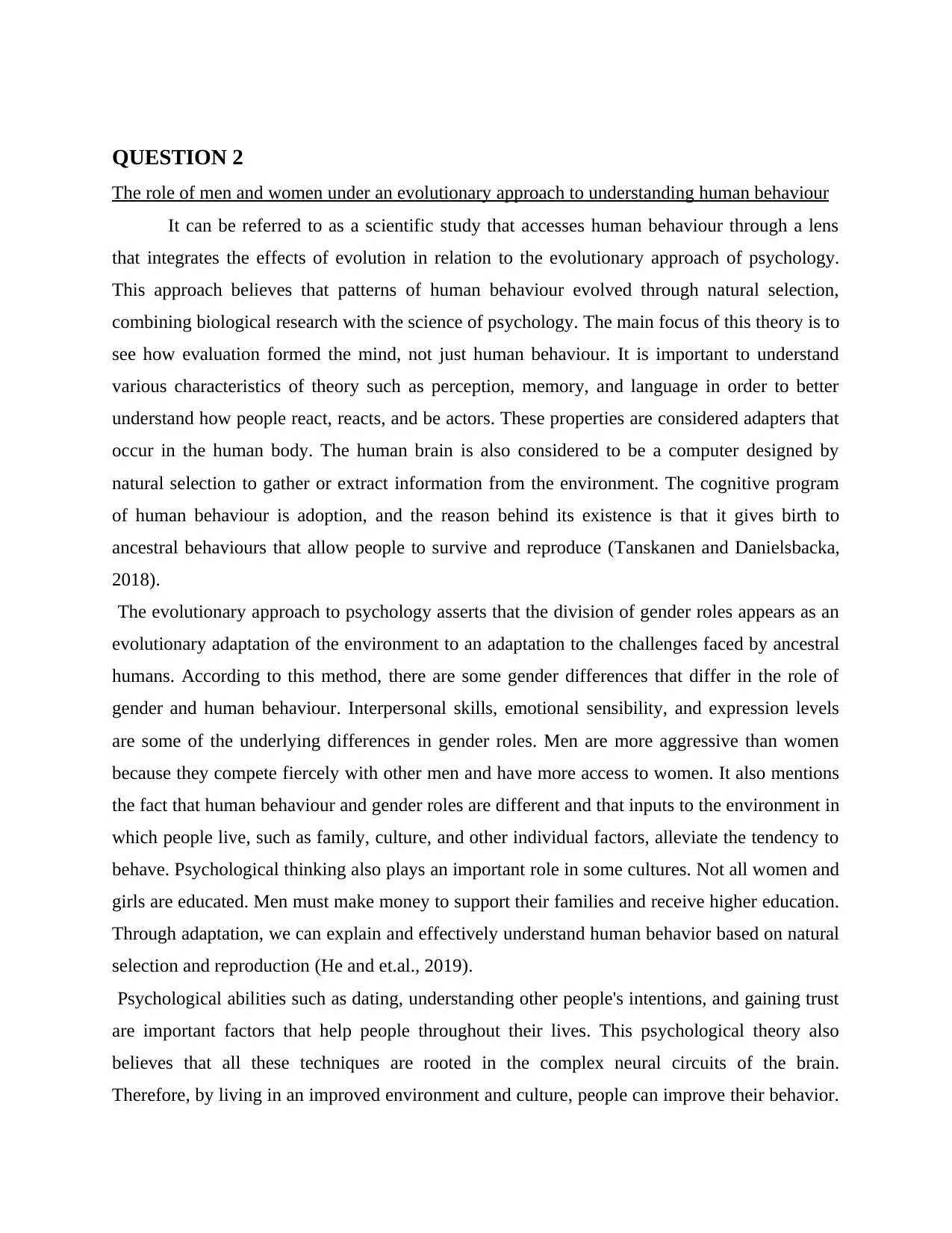
QUESTION 2
The role of men and women under an evolutionary approach to understanding human behaviour
It can be referred to as a scientific study that accesses human behaviour through a lens
that integrates the effects of evolution in relation to the evolutionary approach of psychology.
This approach believes that patterns of human behaviour evolved through natural selection,
combining biological research with the science of psychology. The main focus of this theory is to
see how evaluation formed the mind, not just human behaviour. It is important to understand
various characteristics of theory such as perception, memory, and language in order to better
understand how people react, reacts, and be actors. These properties are considered adapters that
occur in the human body. The human brain is also considered to be a computer designed by
natural selection to gather or extract information from the environment. The cognitive program
of human behaviour is adoption, and the reason behind its existence is that it gives birth to
ancestral behaviours that allow people to survive and reproduce (Tanskanen and Danielsbacka,
2018).
The evolutionary approach to psychology asserts that the division of gender roles appears as an
evolutionary adaptation of the environment to an adaptation to the challenges faced by ancestral
humans. According to this method, there are some gender differences that differ in the role of
gender and human behaviour. Interpersonal skills, emotional sensibility, and expression levels
are some of the underlying differences in gender roles. Men are more aggressive than women
because they compete fiercely with other men and have more access to women. It also mentions
the fact that human behaviour and gender roles are different and that inputs to the environment in
which people live, such as family, culture, and other individual factors, alleviate the tendency to
behave. Psychological thinking also plays an important role in some cultures. Not all women and
girls are educated. Men must make money to support their families and receive higher education.
Through adaptation, we can explain and effectively understand human behavior based on natural
selection and reproduction (He and et.al., 2019).
Psychological abilities such as dating, understanding other people's intentions, and gaining trust
are important factors that help people throughout their lives. This psychological theory also
believes that all these techniques are rooted in the complex neural circuits of the brain.
Therefore, by living in an improved environment and culture, people can improve their behavior.
The role of men and women under an evolutionary approach to understanding human behaviour
It can be referred to as a scientific study that accesses human behaviour through a lens
that integrates the effects of evolution in relation to the evolutionary approach of psychology.
This approach believes that patterns of human behaviour evolved through natural selection,
combining biological research with the science of psychology. The main focus of this theory is to
see how evaluation formed the mind, not just human behaviour. It is important to understand
various characteristics of theory such as perception, memory, and language in order to better
understand how people react, reacts, and be actors. These properties are considered adapters that
occur in the human body. The human brain is also considered to be a computer designed by
natural selection to gather or extract information from the environment. The cognitive program
of human behaviour is adoption, and the reason behind its existence is that it gives birth to
ancestral behaviours that allow people to survive and reproduce (Tanskanen and Danielsbacka,
2018).
The evolutionary approach to psychology asserts that the division of gender roles appears as an
evolutionary adaptation of the environment to an adaptation to the challenges faced by ancestral
humans. According to this method, there are some gender differences that differ in the role of
gender and human behaviour. Interpersonal skills, emotional sensibility, and expression levels
are some of the underlying differences in gender roles. Men are more aggressive than women
because they compete fiercely with other men and have more access to women. It also mentions
the fact that human behaviour and gender roles are different and that inputs to the environment in
which people live, such as family, culture, and other individual factors, alleviate the tendency to
behave. Psychological thinking also plays an important role in some cultures. Not all women and
girls are educated. Men must make money to support their families and receive higher education.
Through adaptation, we can explain and effectively understand human behavior based on natural
selection and reproduction (He and et.al., 2019).
Psychological abilities such as dating, understanding other people's intentions, and gaining trust
are important factors that help people throughout their lives. This psychological theory also
believes that all these techniques are rooted in the complex neural circuits of the brain.
Therefore, by living in an improved environment and culture, people can improve their behavior.
⊘ This is a preview!⊘
Do you want full access?
Subscribe today to unlock all pages.

Trusted by 1+ million students worldwide
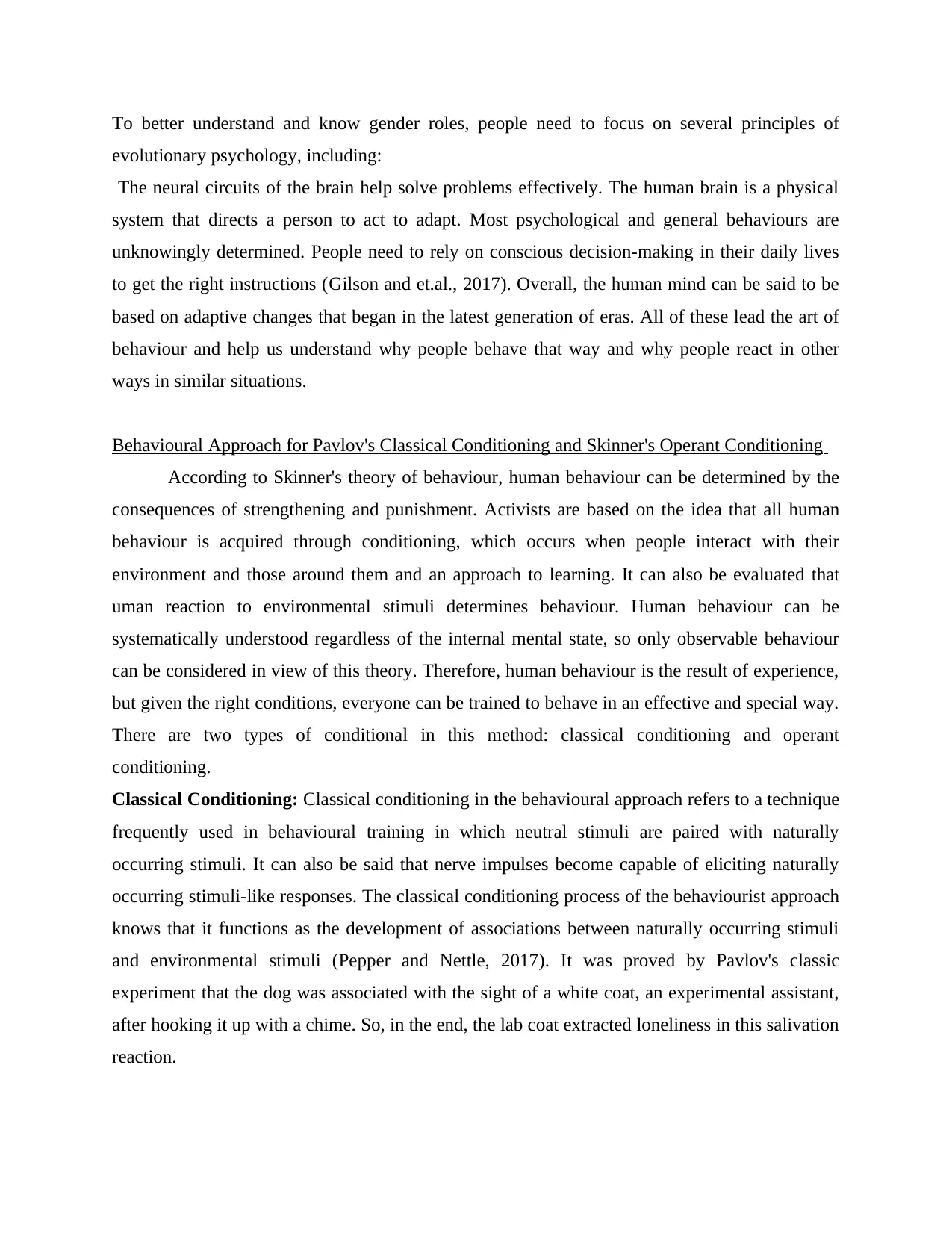
To better understand and know gender roles, people need to focus on several principles of
evolutionary psychology, including:
The neural circuits of the brain help solve problems effectively. The human brain is a physical
system that directs a person to act to adapt. Most psychological and general behaviours are
unknowingly determined. People need to rely on conscious decision-making in their daily lives
to get the right instructions (Gilson and et.al., 2017). Overall, the human mind can be said to be
based on adaptive changes that began in the latest generation of eras. All of these lead the art of
behaviour and help us understand why people behave that way and why people react in other
ways in similar situations.
Behavioural Approach for Pavlov's Classical Conditioning and Skinner's Operant Conditioning
According to Skinner's theory of behaviour, human behaviour can be determined by the
consequences of strengthening and punishment. Activists are based on the idea that all human
behaviour is acquired through conditioning, which occurs when people interact with their
environment and those around them and an approach to learning. It can also be evaluated that
uman reaction to environmental stimuli determines behaviour. Human behaviour can be
systematically understood regardless of the internal mental state, so only observable behaviour
can be considered in view of this theory. Therefore, human behaviour is the result of experience,
but given the right conditions, everyone can be trained to behave in an effective and special way.
There are two types of conditional in this method: classical conditioning and operant
conditioning.
Classical Conditioning: Classical conditioning in the behavioural approach refers to a technique
frequently used in behavioural training in which neutral stimuli are paired with naturally
occurring stimuli. It can also be said that nerve impulses become capable of eliciting naturally
occurring stimuli-like responses. The classical conditioning process of the behaviourist approach
knows that it functions as the development of associations between naturally occurring stimuli
and environmental stimuli (Pepper and Nettle, 2017). It was proved by Pavlov's classic
experiment that the dog was associated with the sight of a white coat, an experimental assistant,
after hooking it up with a chime. So, in the end, the lab coat extracted loneliness in this salivation
reaction.
evolutionary psychology, including:
The neural circuits of the brain help solve problems effectively. The human brain is a physical
system that directs a person to act to adapt. Most psychological and general behaviours are
unknowingly determined. People need to rely on conscious decision-making in their daily lives
to get the right instructions (Gilson and et.al., 2017). Overall, the human mind can be said to be
based on adaptive changes that began in the latest generation of eras. All of these lead the art of
behaviour and help us understand why people behave that way and why people react in other
ways in similar situations.
Behavioural Approach for Pavlov's Classical Conditioning and Skinner's Operant Conditioning
According to Skinner's theory of behaviour, human behaviour can be determined by the
consequences of strengthening and punishment. Activists are based on the idea that all human
behaviour is acquired through conditioning, which occurs when people interact with their
environment and those around them and an approach to learning. It can also be evaluated that
uman reaction to environmental stimuli determines behaviour. Human behaviour can be
systematically understood regardless of the internal mental state, so only observable behaviour
can be considered in view of this theory. Therefore, human behaviour is the result of experience,
but given the right conditions, everyone can be trained to behave in an effective and special way.
There are two types of conditional in this method: classical conditioning and operant
conditioning.
Classical Conditioning: Classical conditioning in the behavioural approach refers to a technique
frequently used in behavioural training in which neutral stimuli are paired with naturally
occurring stimuli. It can also be said that nerve impulses become capable of eliciting naturally
occurring stimuli-like responses. The classical conditioning process of the behaviourist approach
knows that it functions as the development of associations between naturally occurring stimuli
and environmental stimuli (Pepper and Nettle, 2017). It was proved by Pavlov's classic
experiment that the dog was associated with the sight of a white coat, an experimental assistant,
after hooking it up with a chime. So, in the end, the lab coat extracted loneliness in this salivation
reaction.
Paraphrase This Document
Need a fresh take? Get an instant paraphrase of this document with our AI Paraphraser
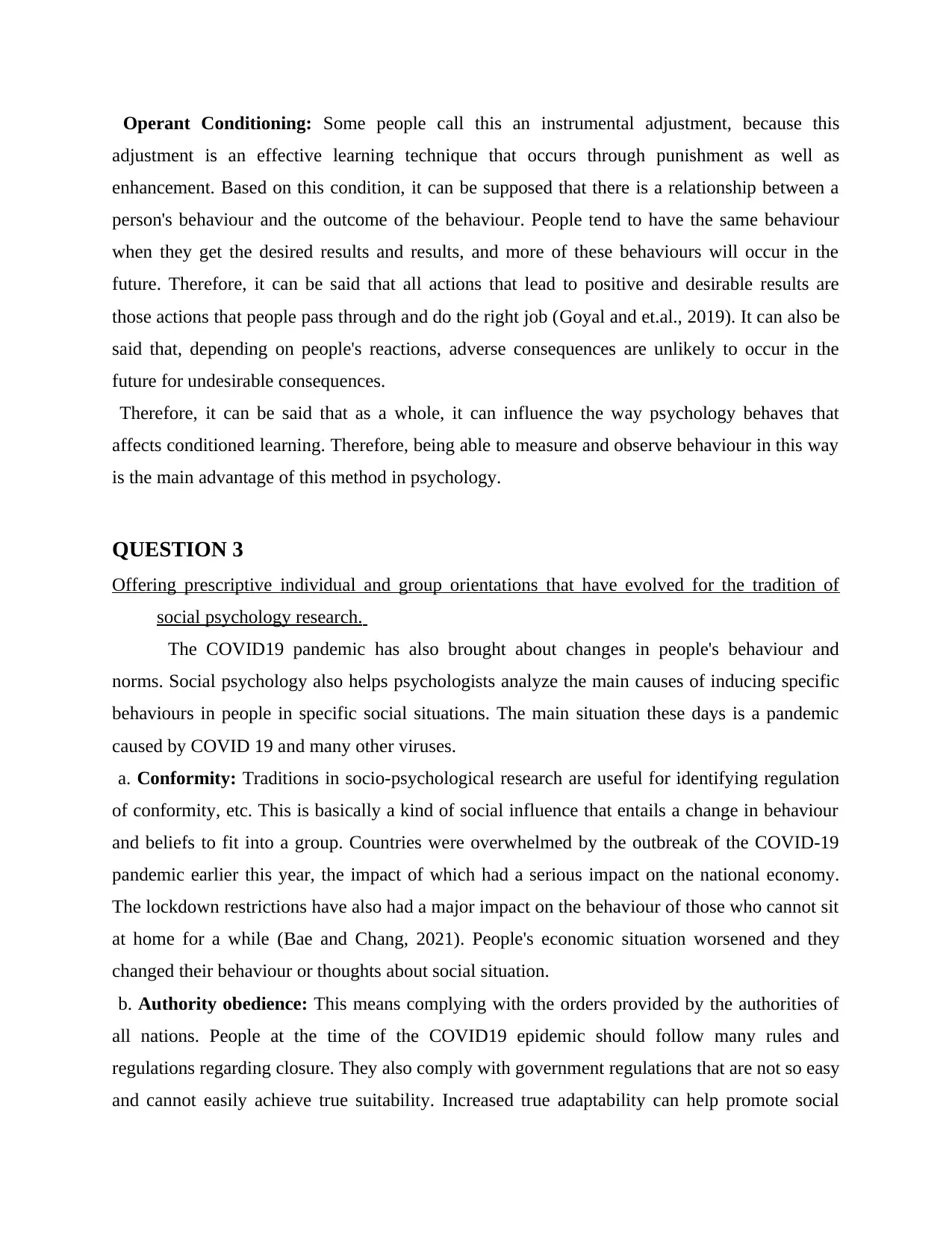
Operant Conditioning: Some people call this an instrumental adjustment, because this
adjustment is an effective learning technique that occurs through punishment as well as
enhancement. Based on this condition, it can be supposed that there is a relationship between a
person's behaviour and the outcome of the behaviour. People tend to have the same behaviour
when they get the desired results and results, and more of these behaviours will occur in the
future. Therefore, it can be said that all actions that lead to positive and desirable results are
those actions that people pass through and do the right job (Goyal and et.al., 2019). It can also be
said that, depending on people's reactions, adverse consequences are unlikely to occur in the
future for undesirable consequences.
Therefore, it can be said that as a whole, it can influence the way psychology behaves that
affects conditioned learning. Therefore, being able to measure and observe behaviour in this way
is the main advantage of this method in psychology.
QUESTION 3
Offering prescriptive individual and group orientations that have evolved for the tradition of
social psychology research.
The COVID19 pandemic has also brought about changes in people's behaviour and
norms. Social psychology also helps psychologists analyze the main causes of inducing specific
behaviours in people in specific social situations. The main situation these days is a pandemic
caused by COVID 19 and many other viruses.
a. Conformity: Traditions in socio-psychological research are useful for identifying regulation
of conformity, etc. This is basically a kind of social influence that entails a change in behaviour
and beliefs to fit into a group. Countries were overwhelmed by the outbreak of the COVID-19
pandemic earlier this year, the impact of which had a serious impact on the national economy.
The lockdown restrictions have also had a major impact on the behaviour of those who cannot sit
at home for a while (Bae and Chang, 2021). People's economic situation worsened and they
changed their behaviour or thoughts about social situation.
b. Authority obedience: This means complying with the orders provided by the authorities of
all nations. People at the time of the COVID19 epidemic should follow many rules and
regulations regarding closure. They also comply with government regulations that are not so easy
and cannot easily achieve true suitability. Increased true adaptability can help promote social
adjustment is an effective learning technique that occurs through punishment as well as
enhancement. Based on this condition, it can be supposed that there is a relationship between a
person's behaviour and the outcome of the behaviour. People tend to have the same behaviour
when they get the desired results and results, and more of these behaviours will occur in the
future. Therefore, it can be said that all actions that lead to positive and desirable results are
those actions that people pass through and do the right job (Goyal and et.al., 2019). It can also be
said that, depending on people's reactions, adverse consequences are unlikely to occur in the
future for undesirable consequences.
Therefore, it can be said that as a whole, it can influence the way psychology behaves that
affects conditioned learning. Therefore, being able to measure and observe behaviour in this way
is the main advantage of this method in psychology.
QUESTION 3
Offering prescriptive individual and group orientations that have evolved for the tradition of
social psychology research.
The COVID19 pandemic has also brought about changes in people's behaviour and
norms. Social psychology also helps psychologists analyze the main causes of inducing specific
behaviours in people in specific social situations. The main situation these days is a pandemic
caused by COVID 19 and many other viruses.
a. Conformity: Traditions in socio-psychological research are useful for identifying regulation
of conformity, etc. This is basically a kind of social influence that entails a change in behaviour
and beliefs to fit into a group. Countries were overwhelmed by the outbreak of the COVID-19
pandemic earlier this year, the impact of which had a serious impact on the national economy.
The lockdown restrictions have also had a major impact on the behaviour of those who cannot sit
at home for a while (Bae and Chang, 2021). People's economic situation worsened and they
changed their behaviour or thoughts about social situation.
b. Authority obedience: This means complying with the orders provided by the authorities of
all nations. People at the time of the COVID19 epidemic should follow many rules and
regulations regarding closure. They also comply with government regulations that are not so easy
and cannot easily achieve true suitability. Increased true adaptability can help promote social
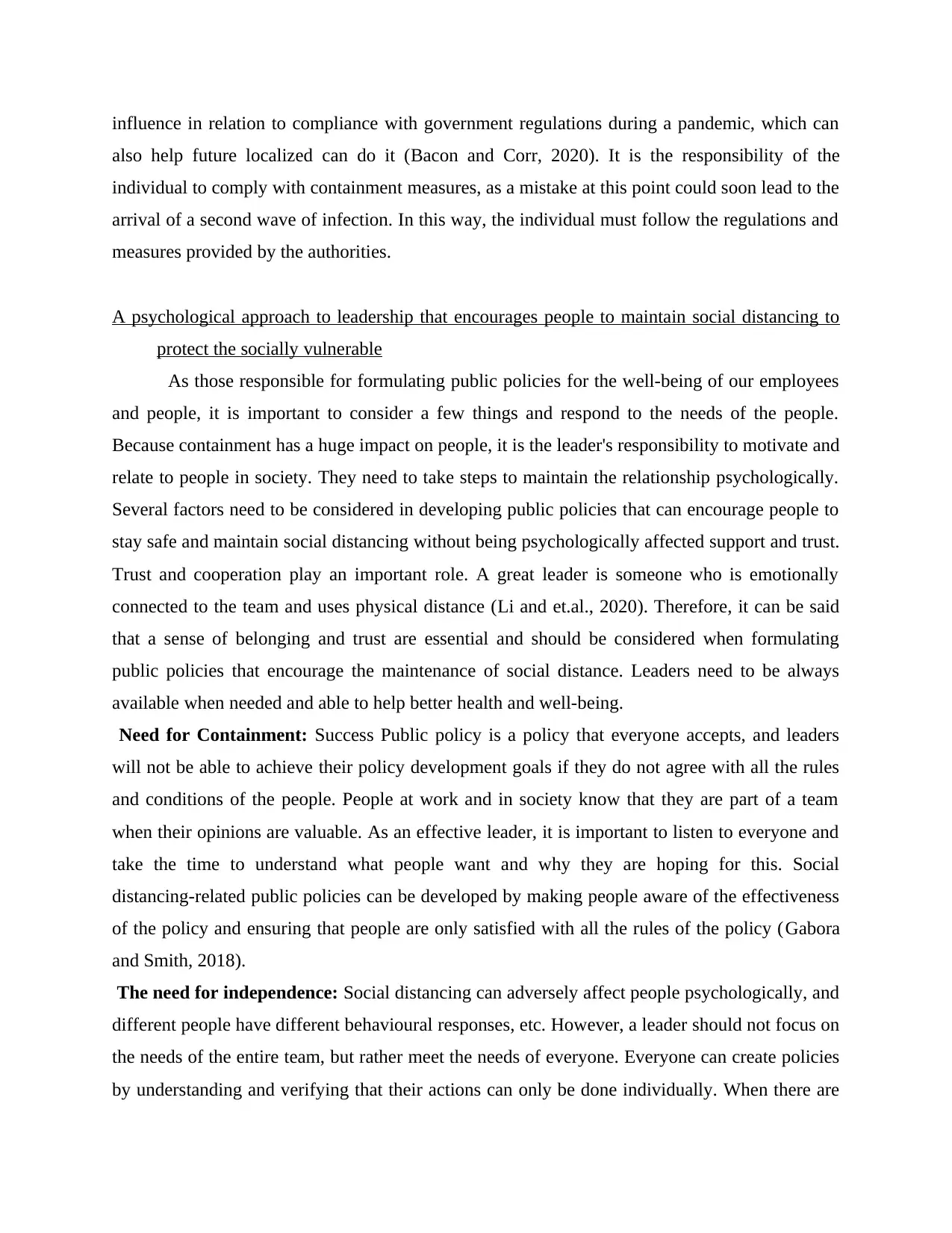
influence in relation to compliance with government regulations during a pandemic, which can
also help future localized can do it (Bacon and Corr, 2020). It is the responsibility of the
individual to comply with containment measures, as a mistake at this point could soon lead to the
arrival of a second wave of infection. In this way, the individual must follow the regulations and
measures provided by the authorities.
A psychological approach to leadership that encourages people to maintain social distancing to
protect the socially vulnerable
As those responsible for formulating public policies for the well-being of our employees
and people, it is important to consider a few things and respond to the needs of the people.
Because containment has a huge impact on people, it is the leader's responsibility to motivate and
relate to people in society. They need to take steps to maintain the relationship psychologically.
Several factors need to be considered in developing public policies that can encourage people to
stay safe and maintain social distancing without being psychologically affected support and trust.
Trust and cooperation play an important role. A great leader is someone who is emotionally
connected to the team and uses physical distance (Li and et.al., 2020). Therefore, it can be said
that a sense of belonging and trust are essential and should be considered when formulating
public policies that encourage the maintenance of social distance. Leaders need to be always
available when needed and able to help better health and well-being.
Need for Containment: Success Public policy is a policy that everyone accepts, and leaders
will not be able to achieve their policy development goals if they do not agree with all the rules
and conditions of the people. People at work and in society know that they are part of a team
when their opinions are valuable. As an effective leader, it is important to listen to everyone and
take the time to understand what people want and why they are hoping for this. Social
distancing-related public policies can be developed by making people aware of the effectiveness
of the policy and ensuring that people are only satisfied with all the rules of the policy (Gabora
and Smith, 2018).
The need for independence: Social distancing can adversely affect people psychologically, and
different people have different behavioural responses, etc. However, a leader should not focus on
the needs of the entire team, but rather meet the needs of everyone. Everyone can create policies
by understanding and verifying that their actions can only be done individually. When there are
also help future localized can do it (Bacon and Corr, 2020). It is the responsibility of the
individual to comply with containment measures, as a mistake at this point could soon lead to the
arrival of a second wave of infection. In this way, the individual must follow the regulations and
measures provided by the authorities.
A psychological approach to leadership that encourages people to maintain social distancing to
protect the socially vulnerable
As those responsible for formulating public policies for the well-being of our employees
and people, it is important to consider a few things and respond to the needs of the people.
Because containment has a huge impact on people, it is the leader's responsibility to motivate and
relate to people in society. They need to take steps to maintain the relationship psychologically.
Several factors need to be considered in developing public policies that can encourage people to
stay safe and maintain social distancing without being psychologically affected support and trust.
Trust and cooperation play an important role. A great leader is someone who is emotionally
connected to the team and uses physical distance (Li and et.al., 2020). Therefore, it can be said
that a sense of belonging and trust are essential and should be considered when formulating
public policies that encourage the maintenance of social distance. Leaders need to be always
available when needed and able to help better health and well-being.
Need for Containment: Success Public policy is a policy that everyone accepts, and leaders
will not be able to achieve their policy development goals if they do not agree with all the rules
and conditions of the people. People at work and in society know that they are part of a team
when their opinions are valuable. As an effective leader, it is important to listen to everyone and
take the time to understand what people want and why they are hoping for this. Social
distancing-related public policies can be developed by making people aware of the effectiveness
of the policy and ensuring that people are only satisfied with all the rules of the policy (Gabora
and Smith, 2018).
The need for independence: Social distancing can adversely affect people psychologically, and
different people have different behavioural responses, etc. However, a leader should not focus on
the needs of the entire team, but rather meet the needs of everyone. Everyone can create policies
by understanding and verifying that their actions can only be done individually. When there are
⊘ This is a preview!⊘
Do you want full access?
Subscribe today to unlock all pages.

Trusted by 1+ million students worldwide
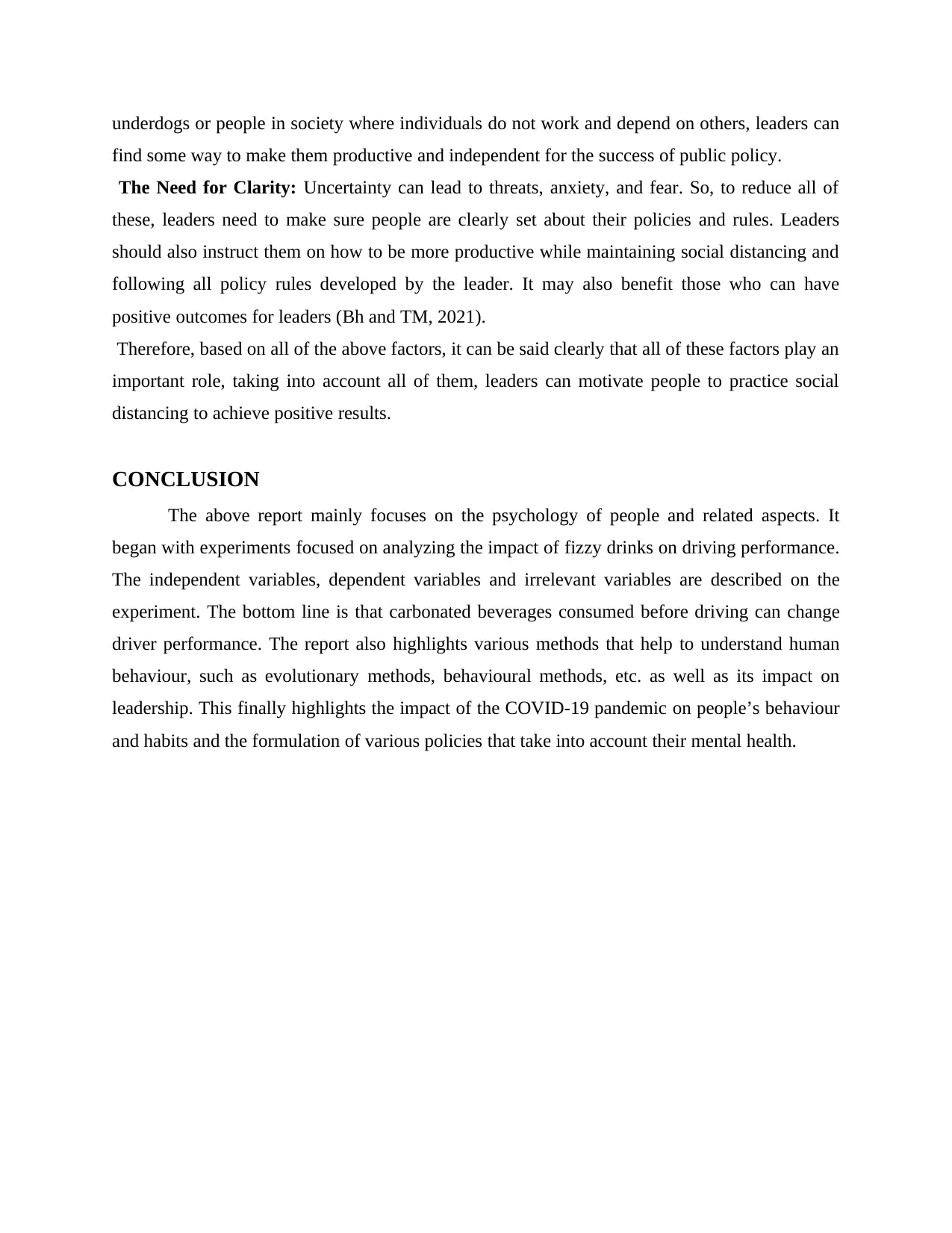
underdogs or people in society where individuals do not work and depend on others, leaders can
find some way to make them productive and independent for the success of public policy.
The Need for Clarity: Uncertainty can lead to threats, anxiety, and fear. So, to reduce all of
these, leaders need to make sure people are clearly set about their policies and rules. Leaders
should also instruct them on how to be more productive while maintaining social distancing and
following all policy rules developed by the leader. It may also benefit those who can have
positive outcomes for leaders (Bh and TM, 2021).
Therefore, based on all of the above factors, it can be said clearly that all of these factors play an
important role, taking into account all of them, leaders can motivate people to practice social
distancing to achieve positive results.
CONCLUSION
The above report mainly focuses on the psychology of people and related aspects. It
began with experiments focused on analyzing the impact of fizzy drinks on driving performance.
The independent variables, dependent variables and irrelevant variables are described on the
experiment. The bottom line is that carbonated beverages consumed before driving can change
driver performance. The report also highlights various methods that help to understand human
behaviour, such as evolutionary methods, behavioural methods, etc. as well as its impact on
leadership. This finally highlights the impact of the COVID-19 pandemic on people’s behaviour
and habits and the formulation of various policies that take into account their mental health.
find some way to make them productive and independent for the success of public policy.
The Need for Clarity: Uncertainty can lead to threats, anxiety, and fear. So, to reduce all of
these, leaders need to make sure people are clearly set about their policies and rules. Leaders
should also instruct them on how to be more productive while maintaining social distancing and
following all policy rules developed by the leader. It may also benefit those who can have
positive outcomes for leaders (Bh and TM, 2021).
Therefore, based on all of the above factors, it can be said clearly that all of these factors play an
important role, taking into account all of them, leaders can motivate people to practice social
distancing to achieve positive results.
CONCLUSION
The above report mainly focuses on the psychology of people and related aspects. It
began with experiments focused on analyzing the impact of fizzy drinks on driving performance.
The independent variables, dependent variables and irrelevant variables are described on the
experiment. The bottom line is that carbonated beverages consumed before driving can change
driver performance. The report also highlights various methods that help to understand human
behaviour, such as evolutionary methods, behavioural methods, etc. as well as its impact on
leadership. This finally highlights the impact of the COVID-19 pandemic on people’s behaviour
and habits and the formulation of various policies that take into account their mental health.
Paraphrase This Document
Need a fresh take? Get an instant paraphrase of this document with our AI Paraphraser
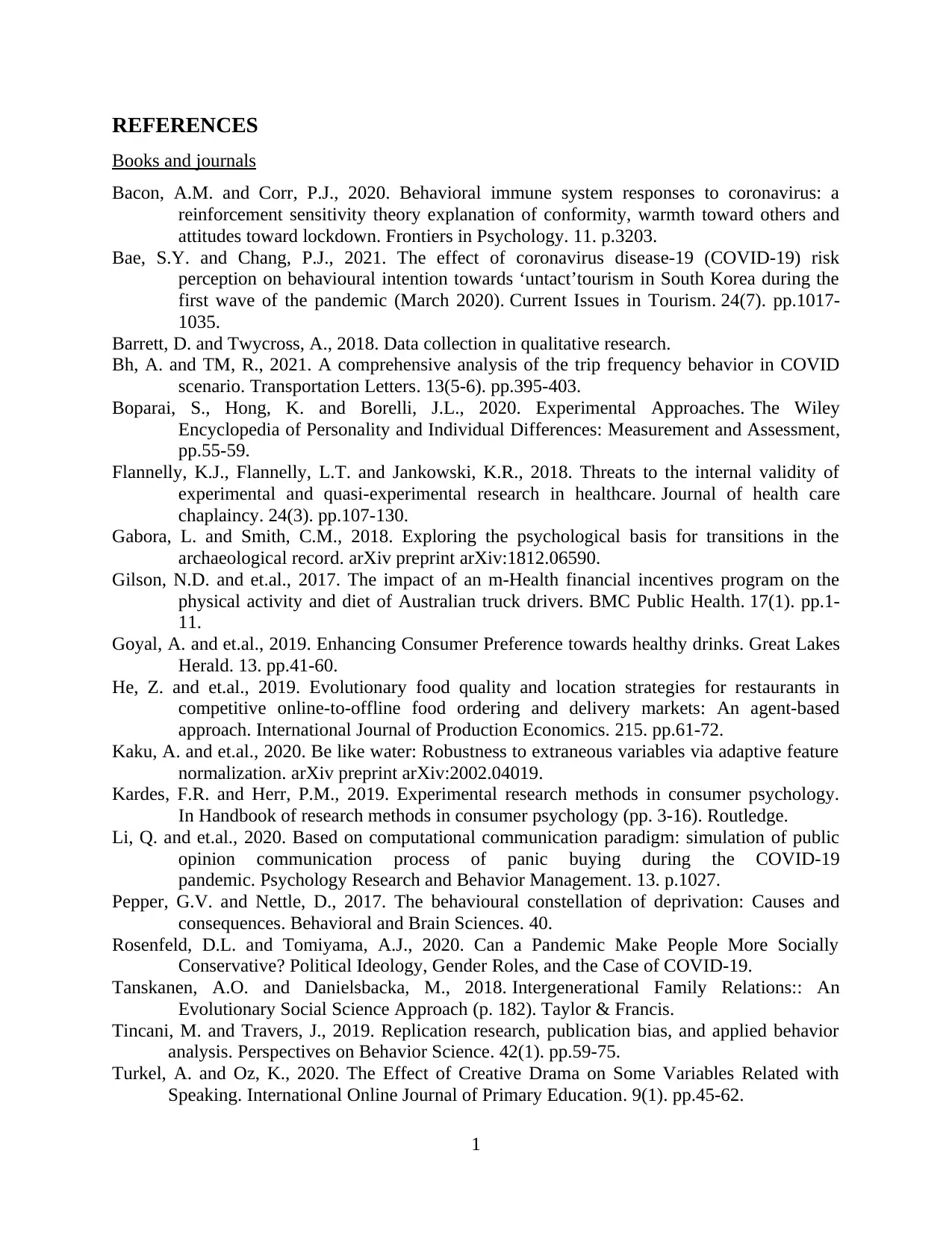
REFERENCES
Books and journals
Bacon, A.M. and Corr, P.J., 2020. Behavioral immune system responses to coronavirus: a
reinforcement sensitivity theory explanation of conformity, warmth toward others and
attitudes toward lockdown. Frontiers in Psychology. 11. p.3203.
Bae, S.Y. and Chang, P.J., 2021. The effect of coronavirus disease-19 (COVID-19) risk
perception on behavioural intention towards ‘untact’tourism in South Korea during the
first wave of the pandemic (March 2020). Current Issues in Tourism. 24(7). pp.1017-
1035.
Barrett, D. and Twycross, A., 2018. Data collection in qualitative research.
Bh, A. and TM, R., 2021. A comprehensive analysis of the trip frequency behavior in COVID
scenario. Transportation Letters. 13(5-6). pp.395-403.
Boparai, S., Hong, K. and Borelli, J.L., 2020. Experimental Approaches. The Wiley
Encyclopedia of Personality and Individual Differences: Measurement and Assessment,
pp.55-59.
Flannelly, K.J., Flannelly, L.T. and Jankowski, K.R., 2018. Threats to the internal validity of
experimental and quasi-experimental research in healthcare. Journal of health care
chaplaincy. 24(3). pp.107-130.
Gabora, L. and Smith, C.M., 2018. Exploring the psychological basis for transitions in the
archaeological record. arXiv preprint arXiv:1812.06590.
Gilson, N.D. and et.al., 2017. The impact of an m-Health financial incentives program on the
physical activity and diet of Australian truck drivers. BMC Public Health. 17(1). pp.1-
11.
Goyal, A. and et.al., 2019. Enhancing Consumer Preference towards healthy drinks. Great Lakes
Herald. 13. pp.41-60.
He, Z. and et.al., 2019. Evolutionary food quality and location strategies for restaurants in
competitive online-to-offline food ordering and delivery markets: An agent-based
approach. International Journal of Production Economics. 215. pp.61-72.
Kaku, A. and et.al., 2020. Be like water: Robustness to extraneous variables via adaptive feature
normalization. arXiv preprint arXiv:2002.04019.
Kardes, F.R. and Herr, P.M., 2019. Experimental research methods in consumer psychology.
In Handbook of research methods in consumer psychology (pp. 3-16). Routledge.
Li, Q. and et.al., 2020. Based on computational communication paradigm: simulation of public
opinion communication process of panic buying during the COVID-19
pandemic. Psychology Research and Behavior Management. 13. p.1027.
Pepper, G.V. and Nettle, D., 2017. The behavioural constellation of deprivation: Causes and
consequences. Behavioral and Brain Sciences. 40.
Rosenfeld, D.L. and Tomiyama, A.J., 2020. Can a Pandemic Make People More Socially
Conservative? Political Ideology, Gender Roles, and the Case of COVID-19.
Tanskanen, A.O. and Danielsbacka, M., 2018. Intergenerational Family Relations:: An
Evolutionary Social Science Approach (p. 182). Taylor & Francis.
Tincani, M. and Travers, J., 2019. Replication research, publication bias, and applied behavior
analysis. Perspectives on Behavior Science. 42(1). pp.59-75.
Turkel, A. and Oz, K., 2020. The Effect of Creative Drama on Some Variables Related with
Speaking. International Online Journal of Primary Education. 9(1). pp.45-62.
1
Books and journals
Bacon, A.M. and Corr, P.J., 2020. Behavioral immune system responses to coronavirus: a
reinforcement sensitivity theory explanation of conformity, warmth toward others and
attitudes toward lockdown. Frontiers in Psychology. 11. p.3203.
Bae, S.Y. and Chang, P.J., 2021. The effect of coronavirus disease-19 (COVID-19) risk
perception on behavioural intention towards ‘untact’tourism in South Korea during the
first wave of the pandemic (March 2020). Current Issues in Tourism. 24(7). pp.1017-
1035.
Barrett, D. and Twycross, A., 2018. Data collection in qualitative research.
Bh, A. and TM, R., 2021. A comprehensive analysis of the trip frequency behavior in COVID
scenario. Transportation Letters. 13(5-6). pp.395-403.
Boparai, S., Hong, K. and Borelli, J.L., 2020. Experimental Approaches. The Wiley
Encyclopedia of Personality and Individual Differences: Measurement and Assessment,
pp.55-59.
Flannelly, K.J., Flannelly, L.T. and Jankowski, K.R., 2018. Threats to the internal validity of
experimental and quasi-experimental research in healthcare. Journal of health care
chaplaincy. 24(3). pp.107-130.
Gabora, L. and Smith, C.M., 2018. Exploring the psychological basis for transitions in the
archaeological record. arXiv preprint arXiv:1812.06590.
Gilson, N.D. and et.al., 2017. The impact of an m-Health financial incentives program on the
physical activity and diet of Australian truck drivers. BMC Public Health. 17(1). pp.1-
11.
Goyal, A. and et.al., 2019. Enhancing Consumer Preference towards healthy drinks. Great Lakes
Herald. 13. pp.41-60.
He, Z. and et.al., 2019. Evolutionary food quality and location strategies for restaurants in
competitive online-to-offline food ordering and delivery markets: An agent-based
approach. International Journal of Production Economics. 215. pp.61-72.
Kaku, A. and et.al., 2020. Be like water: Robustness to extraneous variables via adaptive feature
normalization. arXiv preprint arXiv:2002.04019.
Kardes, F.R. and Herr, P.M., 2019. Experimental research methods in consumer psychology.
In Handbook of research methods in consumer psychology (pp. 3-16). Routledge.
Li, Q. and et.al., 2020. Based on computational communication paradigm: simulation of public
opinion communication process of panic buying during the COVID-19
pandemic. Psychology Research and Behavior Management. 13. p.1027.
Pepper, G.V. and Nettle, D., 2017. The behavioural constellation of deprivation: Causes and
consequences. Behavioral and Brain Sciences. 40.
Rosenfeld, D.L. and Tomiyama, A.J., 2020. Can a Pandemic Make People More Socially
Conservative? Political Ideology, Gender Roles, and the Case of COVID-19.
Tanskanen, A.O. and Danielsbacka, M., 2018. Intergenerational Family Relations:: An
Evolutionary Social Science Approach (p. 182). Taylor & Francis.
Tincani, M. and Travers, J., 2019. Replication research, publication bias, and applied behavior
analysis. Perspectives on Behavior Science. 42(1). pp.59-75.
Turkel, A. and Oz, K., 2020. The Effect of Creative Drama on Some Variables Related with
Speaking. International Online Journal of Primary Education. 9(1). pp.45-62.
1
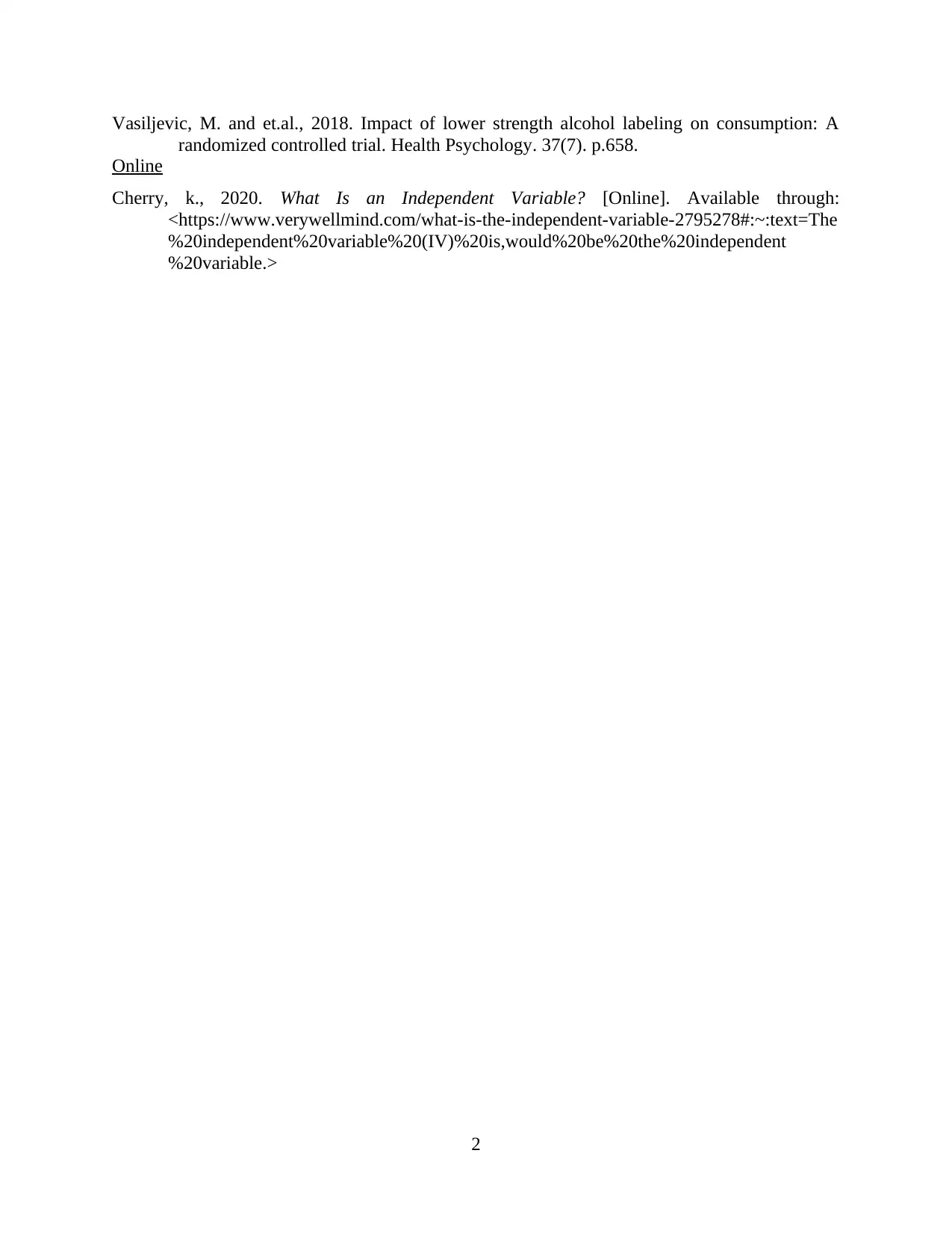
Vasiljevic, M. and et.al., 2018. Impact of lower strength alcohol labeling on consumption: A
randomized controlled trial. Health Psychology. 37(7). p.658.
Online
Cherry, k., 2020. What Is an Independent Variable? [Online]. Available through:
<https://www.verywellmind.com/what-is-the-independent-variable-2795278#:~:text=The
%20independent%20variable%20(IV)%20is,would%20be%20the%20independent
%20variable.>
2
randomized controlled trial. Health Psychology. 37(7). p.658.
Online
Cherry, k., 2020. What Is an Independent Variable? [Online]. Available through:
<https://www.verywellmind.com/what-is-the-independent-variable-2795278#:~:text=The
%20independent%20variable%20(IV)%20is,would%20be%20the%20independent
%20variable.>
2
⊘ This is a preview!⊘
Do you want full access?
Subscribe today to unlock all pages.

Trusted by 1+ million students worldwide
1 out of 12
Related Documents
Your All-in-One AI-Powered Toolkit for Academic Success.
+13062052269
info@desklib.com
Available 24*7 on WhatsApp / Email
![[object Object]](/_next/static/media/star-bottom.7253800d.svg)
Unlock your academic potential
Copyright © 2020–2025 A2Z Services. All Rights Reserved. Developed and managed by ZUCOL.




